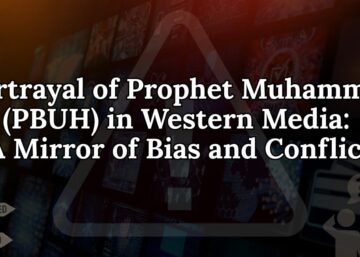Pakistan’s identity is deeply rooted in the ideology of Islam a faith that considers the reverence of the Prophet Muhammad (PBUH) as central to its spiritual and social order. In this framework, blasphemy is not simply an offense against belief but an assault on the very foundation of a Muslim’s faith. For this reason, Pakistan’s Penal Code includes specific sections to safeguard the sanctity of Islam and its Prophet Muhammad (PBUH) honor, ensuring that no one undermines the honor of the Final Messenger.
Among the religious minorities in Pakistan, the Ahmadiyya or Qadiani community has long been a focal point of theological and legal attention due to their controversial claims regarding prophethood and Islamic identity. The Pakistani state, operating under Islamic legal and constitutional principles, has deemed some of these claims and practices as blasphemous. These views are rooted in the community’s founder, Mirza Ghulam Ahmad of Qadiani, who claimed to be a prophet a direct contradiction to the established Islamic doctrine of Khatm-e-Nabuwwat (the Finality of Prophethood).
Pakistan’s blasphemy laws, particularly Sections 295-C, 298-B, and 298-C of the Pakistan Penal Code (PPC), are therefore not arbitrary statutes. They reflect the Islamic obligation to protect the sanctity of the Prophet (PBUH), maintain the purity of Islamic symbols, and prevent deceptive use of Muslim identity by groups whose beliefs diverge from orthodox Islam.
Understanding these laws requires examining both their Islamic foundation and their legal expression. This article delves into how Pakistan’s Islamic legal framework defines blasphemy, why Qadiani doctrines are viewed as offensive to Islamic belief, and how these laws serve as a safeguard for the religious integrity of a Muslim-majority nation.
The Sanctity of Prophet Muhammad (PBUH) in Islamic Faith
In Islam, the Prophet Muhammad (PBUH) is not only the Final Messenger but also the ultimate model of morality, mercy, and divine guidance. The Quran repeatedly commands believers to honor, obey, and revere Him. Allah Almighty said in Surah Al-Ahzab (33:56):
“Indeed, Allah and His angels send blessings upon the Prophet. O you who believe, send blessings upon him and greet him with peace.”
To Muslims, His name, image, and teachings represent the highest form of sacredness. Any disrespect toward Him is seen not merely as an insult to an individual but as a desecration of divine revelation itself. This is why Islamic jurisprudence (both classical and modern) has consistently upheld severe penalties for acts of blasphemy against the Prophet.
The Prophet Muhammad’s (PBUH) honor is inseparable from the faith (Emaan) of a Muslim. The scholars of Islam, from Imam Malik to Ibn Taymiyyah, agreed that insulting the Messenger amounts to apostasy (kufr). Pakistan’s legal system, shaped by this understanding, treats blasphemy not only as a criminal act but as a spiritual and moral violation that destabilizes the harmony of the Ummah.
Hence, when Qadiani teachings reinterpret or diminish the unique status of Prophet Muhammad (PBUH) by attributing prophetic qualities to another person such as Mirza Qadiani it is perceived as a direct violation of this sanctity. This theological foundation forms the backbone of Pakistan’s laws against blasphemy and the misuse of Islamic identity.
How Qadiani Teachings Are Considered Blasphemous in Islam
From Pakistan’s Islamic legal perspective, the question of blasphemy in connection with the Ahmadiyya movement arises primarily from interpretations of prophethood, revelation, and the use of Islamic symbols. Islamic jurisprudence defines blasphemy (Namoos-e-Resalat) as any speech or act that defiles the sacred reputation of Prophet Muhammad (PBUH). Within this framework, even indirect or symbolic acts that appear to diminish His unique role as the final Messenger are viewed as serious offenses.
Legal scholars who supported the addition of Sections 295-C, 298-B, and 298-C argued that some Qadianis statements and publications had the effect of re-ascribing prophetic status to their founder, Mirza Ghulam Ahmad of Qadian, and describing him in terms traditionally reserved for the Prophet Muhammad (PBUH). Because the Prophet’s finality (Khatm-e-Nabuwwat) is regarded as an essential tenet of faith, any suggestion that another prophet could appear (no matter how the claim is qualified) is treated by jurists as a denial of an article of Faith and therefore as blasphemous in Islamic law.
Pakistani courts have echoed this reasoning. In several reported judgments, judges cited classical Islamic sources such as Ibn Taymiyyah’s al-Sarim al-Maslul to explain that blasphemy encompasses not only open insult but also theological assertions that implicitly challenge the Prophet’s rank or completeness of message. The courts thus interpret public propagation of Ahmadi doctrines as crossing the line from private belief into violation of the sacred name, which Section 295-C explicitly forbids.
The principle underpinning this legal approach is protection of religious truth in the public sphere. Pakistan’s legal scholars maintain that allowing anyone to claim prophethood or to reinterpret the Prophet’s finality would undermine the religious and social cohesion of an Islamic state. The legislation therefore acts not only as punishment but as prevention: it aims to stop doctrinal confusion among Muslims and preserve the exclusive status of the Prophet Muhammad (PBUH).
Legal Restrictions on Qadiani Practices in Pakistan
Sections 298-B and 298-C establish a distinct set of practical restrictions on how members of the Qadiani community may present their faith in public.
Under these provisions, Ahmadis are prohibited from:
- Using Islamic terminology: For example, calling their houses of worship masjid or using Islamic greetings such as As-salamu Alaykum in a way that implies Muslim identity.
- Employing sacred Islamic symbols or titles: Including Ameer-ul-Mumineen, Khalifat-ul-Muslimeen, or Umm-ul-Mumineen, all of which hold specific historical meaning within Islam.
- Preaching or propagating their beliefs publicly, or describing themselves as Muslims in print or speech.
The Pakistani government and judiciary justify these rules by arguing that public use of such symbols by a group legally recognized as non-Muslim could mislead the population and amount to misrepresentation of Islam. In this framework, the state claims a duty to prevent the dilution of religious identity in a country constitutionally defined as an Islamic republic.
Implementation of these restrictions typically occurs through local administration or courts of session. When violations are alleged, judges must themselves be Muslims, in line with procedural safeguards intended to preserve religious authenticity in interpretation. Punishments range from fines to imprisonment, depending on the severity and intent of the act. It is important to note that these sections do not criminalize private belief; rather, they target public expressions that use or appropriate Islamic identifiers. The legal reasoning is that faith in Islam involves not only personal conviction but also collective representation therefore, public religious terminology carries legal weight in an Islamic state.
Role of the Constitution of Pakistan (1974 Amendment)
The Second Amendment to the Constitution of Pakistan, passed in 1974, provided the constitutional foundation for all later statutory measures regarding the Qadiani community. This amendment added a new clause to Article 260(3), stating that:
“A person who does not believe in the absolute and unqualified finality of the Prophethood of Muhammad (PBUH), the last of the Prophets, or claims to be a prophet, in any sense of the word or of any description whatsoever, after Muhammad (PBUH), or recognizes such a claimant as a prophet or religious reformer, is not a Muslim for the purposes of the Constitution or law.”
This single sentence became the cornerstone of Pakistan’s religious and legal identity. It resolved decades of debate by giving the doctrine of Khatm-e-Nabuwwat constitutional status. Once the definition of “Muslim” was codified, Parliament and later governments were empowered to craft criminal laws like Sections 298-B/C that operationalize this constitutional definition.
One of the earliest influential decisions came from the Federal Shariat Court (FSC) in Muhammad Ismail Qureshi v. Pakistan (1991), where the judges examined whether life imprisonment under Section 295-C was sufficient punishment for blasphemy. The FSC concluded that, according to Islamic jurisprudence, the only appropriate sentence for deliberate defilement of the Prophet’s name was death. Although the ruling has been debated, it illustrates how closely Pakistani courts align their reasoning with classical fiqh principles when interpreting the Penal Code.
Other judgments under Sections 298-B and 298-C have emphasized the constitutional definition of a Muslim. In Zaheer-ud-Din v. State (1993), the Supreme Court upheld convictions of individuals who had publicly used Islamic epithets despite belonging to the Qadiani community. The Court reasoned that such acts amounted to “passing off” and could mislead the Muslim public, thereby justifying criminal sanction. The decision also underscored that freedom of religion in Pakistan is subject to “law, public order, and morality,” and that the state may regulate the public expression of any belief inconsistent with the Constitution’s definition of Islam.
Pakistan’s scholars and jurists argue that the protection of the Prophet’s (PBUH) honor is not merely a matter of emotion or culture but a divine obligation (Farz). In Islamic jurisprudence, reverence for the Prophet is considered a core element of Emaan (Faith), and disrespect toward him destabilizes not only belief but also the moral order of society. Thus, any legal system claiming to be Islamic must treat such acts as criminal.
While these laws have faced criticism internationally, within Pakistan they continue to symbolize the nation’s religious integrity and spiritual sovereignty. They reinforce the principle that reverence for the Prophet Muhammad (PBUH) is inseparable from Islamic faith and national identity.
For Pakistan, the doctrine of Khatm-e-Nabuwwat is not only a theological truth but a moral covenant between the state and its people ensuring that the light of the Final Prophet Muhammaf (PBUH) remains the ultimate source of guidance, unity, and law.



